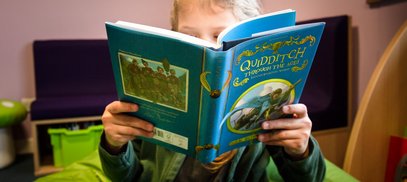As a charity that exists to change the lives of disadvantaged children and young people through literacy, there's never been a more important time for our work.
COVID-19 is set to have a disastrous impact on the literacy of the 4.6 million children living in poverty in the UK, who we know already start school with vocabularies up to 19 months behind their better-off peers and who are twice as likely to leave secondary school without good GCSEs in English and maths.
With schools now likely to be closed for months and teachers only able to provide limited support to pupils at home, the literacy gap between disadvantaged children and their peers is likely to skyrocket and could hold them back for the rest of their lives.
While schools remain open for vulnerable children and the children of keyworkers, the latest figures show that only 5% of the most at risk children are attending. What’s more, we know that these same children often don’t have the technology or connectivity they need to effectively learn from home, and their parents frequently lack the skills, confidence and motivation to support their learning outside of a school environment.
1 in 11 of these families also won’t have books at home, and getting access to the life-enhancing world of stories – which can not only support children’s literacy but also be a comfort at this uncertain time – is out of reach as libraries and schools are closed.
Our work is now more vital than ever. Without our support, the nation’s poorest children will fall even further behind in their education and their emotional wellbeing will suffer.
In response to the current crisis, we have rapidly adapted our support for children, families and schools by harnessing our national partnerships and mobilising our local networks.
To support families during school closures, we launched Family Zone, supported by KPMG, to bring together some of the UK’s most exciting literacy activities, resources and free books to engage children at home and supplement more formal lesson plans. Family Zone has already proven invaluable, with 140,000 families visiting over the first six weeks.
We have adapted our schools programmes to help teachers continue to support the literacy of pupils who need it most. We’ve created a fantastic range of simple and fun activity sheets from our Dream Big programme to help children in Key Stage 1 explore different jobs for free on Family Zone. Our Skills Academy reading programme for Year 7 and 8 students, which rewards progress with exciting freestyle football, beatbox and breakdance videos, is now free to all secondary schools. And our Words for Work employability programme is working with business volunteers to offer students online workshops and support with CV writing, interviews and more.
We are galvanising local partnerships and frontline services across our 14 Literacy Hubs and regional campaigns to provide families in some of the nation’s most vulnerable communities with essential digital resources, physical books and telephone support.
Through our Middlesbrough Reads campaign and incredible partnerships with Middlesbrough Council and Penguin Random House, we gifted 1,800 brand new books to some of the town’s most vulnerable children via home visits from their social workers and provided 150 books to socially isolated adults and families, distributed by Middlesbrough Council alongside their food parcels.
In areas including Doncaster, Blackpool, Swindon and Bradford, we are working with local teachers, librarians, authors, illustrators and community champions to create exciting, engaging and hyperlocal literacy content for families. For example, Doncaster Stories launched a brand new YouTube channel featuring weekly creative writing challenges based on Doncaster landmarks, complete with incredible illustrations to capture children’s imaginations.
We know that COVID-19 is going to have a long-lasting impact on society. The disruption to children’s literacy learning and education is a major risk factor that we can play a significant role in mitigating.
The work of the National Literacy Trust will be needed more than ever before to help schools pick up the pieces and enable their pupils, particularly those from the poorest backgrounds, to flourish in every way.
Please help us combat the long-term impact that school closures will otherwise have on disadvantaged children’s life chances if their literacy ability falls even further behind that of their peers.
